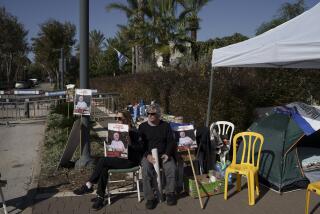Iraq POWs Starting to Show Strain : Saudi Arabia: Most have been repatriated. Some who remain can’t wait to go home; others refuse to leave.
RIYADH, Saudi Arabia — For some of the thousands of Iraqi prisoners of war still held in detention camps in Saudi Arabia, political and psychological tension has apparently led to scattered violence in recent days, sources say.
The daunting task of repatriating the POWs--who once numbered close to 80,000--is nearing an end. Hundreds have refused to go home, however, while others have impatiently protested they are not going home fast enough.
One Iraqi was killed and three were wounded in separate incidents at the crowded camps in northern Saudi Arabia, a Western military source said. One incident involved a near-riot by about 150 rock-throwing Iraqis angered when their return home was delayed, the source said.
Officials, who sought to play down the trouble, pointed to the inevitable friction that occurs when thousands of Iraqis--some who fought in support of Saddam Hussein and others who deserted--are held in close quarters.
“Look at Iraq and you find a . . . wide spectrum of different opinions,” said one Western official. “In a population of 70,000 or 80,000, which has (already) suffered intense psychological stress before capture . . . (differences) are certainly a source of tension.”
Following weeks of relentless air strikes, the Iraqi army seemed to disintegrate in the waning days of the Persian Gulf War, which ended Feb. 28. Iraqi soldiers surrendered en masse, and thousands more were captured.
A total of 78,127 Iraqis were taken into U.S. custody, the U.S. Central Command reported, including at least 10,000 who became POWs after the war ended. Some of these may have been resistance fighters fleeing a failed Shiite Muslim rebellion in southern Iraq.
Most prisoners have since returned home. About 65,000 POWs have been bused to Saudi Arabia’s border with Iraq and freed under the auspices of the International Committee of the Red Cross. All are allowed to refuse to go.
About 13,000 remain in Saudi camps, according to U.S. officials. The Red Cross said it is trying to register the late arrivals, who will also be offered the chance to return to Iraq.
Arnold Luethold, head of the ICRC delegation in Riyadh, said he expects the bulk of the repatriation to be finished “relatively soon.”
Red Cross officials refused to discuss reports of violence in the camps. But military sources said one POW was wounded when a Saudi guard fired into the ground to quell a near-riot by 150 Iraqis throwing rocks.
Pellets from the gun ricocheted, hitting the prisoner in the buttocks. He was not seriously hurt, and the crowd dispersed, the source said. The dispute erupted when repatriation was suspended April 15-16 for a Muslim holiday known as Eid al Fitr, which concludes the holy month of Ramadan.
In a second incident, one prisoner was killed and two wounded, according to military sources.
Luethold confirmed that repatriation was suspended for the holiday and had been further slowed by efforts to register the remaining POWs. The daily trips peaked on April 10, when 6,455 Iraqis returned to their country; only 240 made the journey Sunday.
He would not comment on conditions in the camps, except to say that allied forces seemed to be trying to “fully comply” with the Geneva Conventions, which govern the treatment of prisoners of war.
Further, he said, the Saudis, who now run all the camps, follow the rules of Islam, which say that a war prisoner is not to be considered an enemy but a guest.
“I am satisfied about the tremendous efforts being made here,” Luethold said.
The ICRC refuses to say how many Iraqis have turned down the offer to go home. But a well-placed military source put the number at about 780 as of last week. It is not yet known how many of the estimated 13,000 Iraqis still detained will refuse to return to Iraq. If they are among the more recently taken prisoners, it is likely they will be more eager to stay behind.
Still, the number of Iraqi refusals so far falls short of predictions that American military officials and others had made.
The repatriation has proceeded remarkably smoothly, officials say. Iraq in March handed over 45 allied POWs, including 21 Americans, as well as about 5,000 Kuwaitis. Kuwait, however, says at least another 5,000 of its citizens are still missing.
Iraq has said it released all of its POWs. But Western sources said Sunday that preparations were under way for Iraq to begin repatriating a new round of Kuwaitis. The number would be fewer than 100, a source said.
More to Read
Sign up for Essential California
The most important California stories and recommendations in your inbox every morning.
You may occasionally receive promotional content from the Los Angeles Times.











